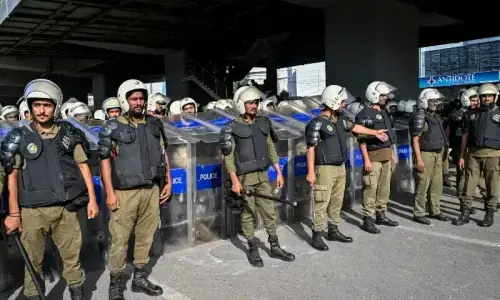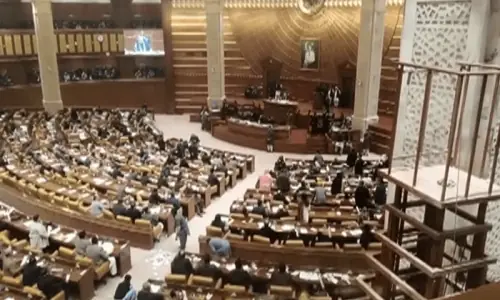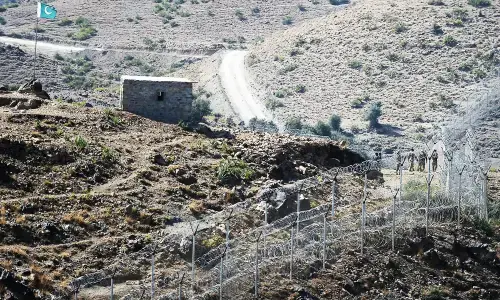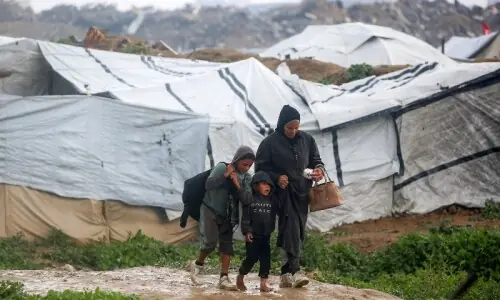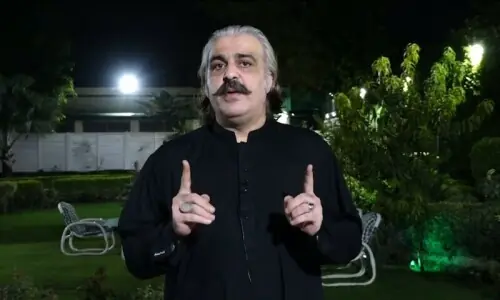 |
| Minarets of the worship place of Ahmedis in Pichnand village before being demolished. The picture below is after they were demolished. — Dawn |
CHAKWAL: On a first visit, one only notices the calm which engulfs the sleepy village of Pichnand, located some 90 kilometres from the district capital, in Talagang tehsil. Most of its 24,000 residents earn their livelihood from agriculture and cattle farming.
And walking through the quiet winding streets of the village, it is hard to tell that underneath the calm, simmer religious tensions with extremism on the rise in the Talagang tehsil, 45 kilometres from Chakwal. New blasphemy cases are routinely registered in the area, in most of which a man named Mohammad Saeed is the complainant and an advocate named Tariq Mehmood is the counsel.
The growing number of such cases has left 80 members of the Ahmedi community, who occupy 15 houses in the Pichnand village, in perpetual state of fear. Religious conferences are regularly organised in the village where hate speech is delivered against the marginalised Ahmedi community. These events have also put the village under the spotlight of the local press.
Read: Ahmadis on the run: Fearing death in People's Colony
The latest blow came on May 4, when on the orders of a District and Sessions court, the minarets and dome of the sole worship place of Ahmedis in the village were demolished.
According to law, a worship place of Ahmedis cannot have minarets or domes as it makes it resemble a mosque. The demolition was welcomed by religious leaders of the area from Deobandi and Barelvi sects alike and for days, local newspapers ran statements from religious leaders who hailed it as a positive step. This has intensified hatred against the Ahmedis in the village.
The central deputy general secretary of Majlis-i-Ehrar Islam Pakistan (MEIP), Dr Omar Farooq, wrote a highly inflammatory article in a local Urdu newspaper titled ‘Qadianis in Pichnand face defeat’.
“We cannot call our worship place a mosque, neither can our worship places have minarets nor domes as these are the symbols of a mosque. We cannot call the Azaan on a loud speaker. We are not even allowed to say ‘Asalam-o-Alaikum’ as we are banned to do so by law,” laments an elder of the Ahmedi community in the village.
“Of course, such law only exists in Pakistan,” he hastens to add.
 |
The first Ahmedi of this village was Malik Mohammad Khan a soldier in the British Army, who during the First World War became an Ahmedi. Most Ahmedi residents of the village today belong to lower social castes and are vulnerable to attacks at the hands of extremist clerics.
“The situation was quite peaceful till 2008 when a campaign was launched against us by some hardliner clerics residing in Talagang,” says an Ahmedi resident.
Also read: Ahmadis, seared to the wall
In 2008 some clerics from Talagang city launched a campaign against Ahmedis claiming that they were trying to expand their worship place. This campaign resulted in the registration of a case in 2011.
Since 2008, anti-Ahmedi literature is routinely distributed in the village. Three years later the first conference titled ‘Tahafuz-i-Khatam-i-Nabuwat’ was organised in the village by Tehreek-i-Tahafuz-i-Khatam-i-Nabuwat (TTKN) in which the religious leaders deliver hate speech against Ahmedis.
“Pamphlets filled with abusive and derogatory slogans against us are distributed in the village and members of the MEIP and the TTKN put up anti-Ahmedi stickers on the doors of shops and houses in the village,” says another Ahmedi.
Copies of the pamphlets, available with Dawn, speak volumes about the gravity of the situation. One pamphlet issued by the MEIP carries a list of 35 Ahmedi men of the village. The addresses and even castes of all these 35 individuals are mentioned along with their names. The pamphlet urges Muslims of mainstream sects to socially and politically boycott these Ahmedis.
“Such kind of hate material is intensifying the security risk we face. Our children are bullied in the village school and we fear for their lives,” says another member of the Ahmedi community.
The Ahmedis in this village question the seriousness of the much-touted National Action Plan (NAP). “Where is the NAP when hate speeches continue to be delivered and columns against us are published in the press,” asks an Ahmedi.
A police official while admitting the sensitivity of the situation said: “Everyone should be free to live their life in accordance with their religion.”
Talking to Dawn, Amir Mehmood, in-charge of Press Section of Jamaat-i-Ahmediya Pakistan expressed concerns over the plight of Ahmedis in Pakistan.
“We actively participated in the Pakistan Movement but today the space for our community is shrinking each day,” he says.
“In Lahore, 86 Ahmedis were butchered and our women were burnt alive in Gujranwala but we did not even stage a peaceful protest rally. We are bearing all this silently,” he adds.
Holding government responsible for the plight of Ahmedis, Mr Mehmood says the situation is getting worse each day.
“It is the responsibility of the state to protect its citizens irrespective of their religious association,” he says.
When approached, District Police Officer (DPO) Dr Moeen Masood vowed to take action against those involved in spreading hatred against Ahmedis.
“Nobody would be allowed to violate the law. We would take legal action against those who are publishing such hate material,” he said.
Published in Dawn, June 9th, 2015
On a mobile phone? Get the Dawn Mobile App: Apple Store | Google Play


